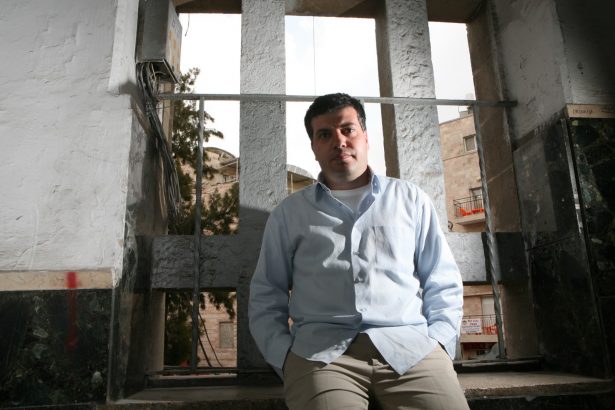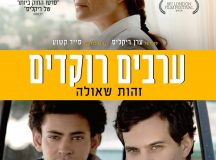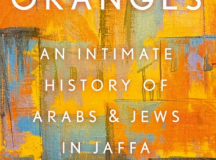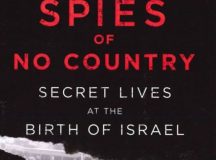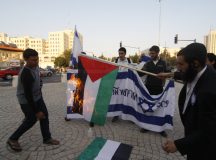‘I wanted to say to my wife that this is really the end, it’s finished,’ the Arab-Israeli writer Sayed Kashua said in his foreboding July 2014 column. ‘That I’d lost my small war, that everything people had told me since I was a teenager was coming true before my eyes. That all those who told me that there is a difference between blood and blood, between one person and another person, were right. That all those who told me that I have no place other than Tira spoke the truth.’
And the end it was. With those words, Kashua – who seemed to embody the idea that there could be a place for Arabs in a Jewish state – left Israel, taking up teaching positions in Illinois at the University of Chicago and the University of Illinois at Champaign-Urbana. In November 2017 his weekly observational column in Ha’aretz, always rich with humour and irony, comedy and tragedy, pathos and bathos, went on hiatus. Kashua believed it no longer fulfilled its primary purpose: ‘Testing the limits of a Palestinian-Israeli’s freedom of expression.’
Those articles, collected in 2015’s Native, were weekend fixtures in his readers’ lives and presented, as Adam Kirsch has written, situations ‘so absurd, and so frightening, that all you can do is laugh – until, like Kashua, you can’t anymore.’ In 2007, Arab Labour, a sitcom created and written by Kashua and broadcast by Keshet on Channel 2 (now Channel 12), introduced, as Ruth Margalit wrote in her 2015 profile of the writer in exile, ‘an Arab family to Israeli audiences for the first time,’ making him a celebrity in the process.
But before Arab Labour and his Ha’aretz columns, with that same searing insight and gallows humour, manipulating the reader and deftly using, as Margalit observes, ‘prejudice like a boomerang,’ Kashua was examining his divided self in his novels: his semi-autobiographical debut, Bildungsroman, Dancing Arabs (2002); the dystopian follow-up, Let It Be Morning (2004); and much later, his most accomplished and daring novel of all, Exposure (2010). The credo that defines and shapes Kashua’s fiction is found in a throwaway line in Let It Be Morning—a question all three novels ask of Israeli Arabs in their own way: ‘Who are they anyhow?’
Dancing Arabs, whose plot is told in beguiling, entrancing vignettes of only two or three pages in length, echoes with stories and memories from Kashua’s own life. Born in 1975 in Tira, part of a concentration of Arab towns and villages in central Israel known as the Triangle, Kashua left at the age of 14 to attend a private Jewish boarding school in Jerusalem and went on to study at Hebrew University. Kashua has said he wrote Dancing Arabs in order to tell ‘the stories that I heard from my grandmother’: how his grandfather was killed in the battle over Tira in 1948; how his grandmother was left landless and raised his father while working as a fruit picker; how his father was jailed for years as a political prisoner. ‘I wanted to tell the Israelis a story, the Palestinian story.’
If Dancing Arabs is a coming-of-age novel, then Let It Be Morning, set during and influenced by the conditions of the Second Intifada, begins in a certain sense where that book (also translated by the late Miriam Shlesinger) left off, with an alienated Arab-Israeli protagonist – in this case a journalist whose work with a Hebrew newspaper has more-or-less dried up, leaving him without an income – leaving Jerusalem for the village where he grew up, a place he no longer recognises (All of his protagonists are male. None have names, as if the names of Arab-Israelis are unimportant.) The villagers discover one morning that their town has been sealed off in a military operation, and with seemingly no end to their de facto imprisonment in sight, things quickly descend into something out of Lord of the Flies, though the novel has the political consciousness of George Orwell or Albert Camus as opposed to William Golding.
In Let It Be Morning Kashua takes on the role of the Nestbeschmutzer, he who befouls his own nest. It was a label often applied to among others, the great Austrian post-war writer Thomas Bernhard, whose novels and plays took swipes at his own country for its provincialism and failure to grapple with its Nazi past. Here, the returning journalist observes how Arab society has abandoned principles of the past like communism and nationalism for Islam, how crime and gang warfare are an evermore prominent feature of village life, and that the tension and division between the Arabs of Israel and the Palestinians of Gaza and the West Bank has been heightened by war and conflict.
An overtly political and darkly humorous novel, Let It Be Morning is a brutal book but one that manages to have a lot of fun with its subject, poking fun at the rituals and niceties of life in an Arab village. This is captured, for instance, in an excerpt where the journalist’s elderly aunts – who have tremendous trouble ascending and descending the stairs to see the baby, with the older one ‘rest[ing] every other step, grasping the railing, panting, muttering, ‘ya Allah,’’ before ‘taking another step or two’ – show up to see his wife and child after they have moved into their new house:
‘Insha’Allah,’ my wife says diplomatically, and heads for the kitchen to get our regular guest kit, the one that all the villagers serve. A bowl of fruit, some nuts, cold drinks. Then she’ll urge them to please help themselves, the way she’s supposed to, and they’ll have to eat or drink something, and toward the end of their visit she’ll offer tea or coffee, a cue that it’s time for them to leave. Tea and coffee must be offered even if they get up to go before you’ve had a chance. You’re always supposed to say, ‘What? Leaving already? You haven’t had your tea yet.’
Of course, coming back to Margalit’s image of the boomerang, if we the reader laugh with Kashua, is the joke in fact on us? Is Kashua indulging the biases of his original Hebrew readership in holding up the image of the overweight Arab auntie as a source of fun? And in the end, if the joke is not on Kashua, it is on the well-meaning liberals of Jewish Israel. By the novel’s conclusion, a peace deal negotiated between Israel and the Palestinians sees the journalist’s village transferred to the new Palestinian state. His editor is delighted:
‘I’ll be in touch with you later. I’ll let you know what happens at the meeting. I think it ought to work out. Listen, there might be a bit of a problem with the pay, because we’re into drastic budget cuts, so it won’t be the way it was before, but your cost of living is going to be much lower now anyway, isn’t it?’
How Arab-Israelis are themselves defined by their relationship with Israeli Jews is critical to understanding Kashua’s work. One could even argue, with Kashua influenced so greatly by Hebrew literature, that his male protagonists, though always Israeli Arabs, in terms of their cynicism, directionless outlook, sexual foibles, and fraught relationships with women take on and closely resemble the Jewish literary archetypes of the schmuck, schlemiel, or schlimazel, like the lawyer from Kashua’s Exposure who tries to sustain intercourse with his wife by summoning sad images from his youth. ‘It would be wrong to say that the lawyer did not enjoy sex, but there was something about it that always bothered him. He found the whole thing to be more of a burden than a pleasure, a situation he knew to be perverse.’
Exposure, translated by Mitch Ginsburg and published in the United States as Second Person Singular, is a gripping tale that plays with identity in challenging and thrilling ways. The aforementioned lawyer comes from a class within Jerusalem society, wanderers from the Galilee and the Triangle, whom he describes as ‘brokers between the noncitizen Arabs and the Israeli authorities, a few thousand people, living within Jerusalem but divorced from the locals among whom they reside.’ Competition within that class is the measure of success: whose children attend the cooperative Jewish-Arab school; who has the newest and most expensive car; who can display the deepest knowledge of ‘the essentials of Western culture.’
The lawyer’s life, without wishing to reveal too much, comes to intersect with that of a social worker who, at novel’s beginning, shares an apartment with two other Israeli Arabs in East Jerusalem that lacks for hot water or adequate heat. To occupy his nights and earn a little extra money, at the suggestion of his roommate he takes on a job as a carer for a brain-damaged Jewish-Israeli in his twenties called Yonatan, whom the social worker feeds, bathes, and turns over every two hours in his sleep lest he develop bed sores. Drawn to Yonatan and the life he once led, the social worker gradually assumes his identity and comes to live not an Arab but a Jewish life.
Besides the thriller element that drives the plot, the joy of Exposure is in the gradual unfolding of the identity crises gripping both lead characters. If in the beginning, the lawyer’s life is shaped by his relationships with other upper-middle class Arab Israelis, then the unravelling of his life – a crisis of masculinity and sexual adequacy – is only heightened by the fact that the assumed previous sexual partner of his wife would have been Jewish. For the social worker, as he takes on Yonatan’s identity, in a sense becoming him upon his death, it is not clear whether he is doing so in order to live the life taken from Yonatan or to assume one that, by virtue of his religion and ethnicity, would otherwise be denied to him:
Today I want to be like them. Today I want to be one of them, to go into the places they’re allowed to go, to laugh the way they laugh, to drink without having to think about God…Free, loose, full of dreams, able to think about love…Like those who started to fill the dance floor with the knowledge that it was theirs, they who felt no need to apologise for their existence, no need to hide their identity…Those who never looked for suspicious glances, whose loyalty was never questioned, whose acceptance was always taken for granted. Today I want to be like them without feeling like I’m committing a crime. I want to drink with them, dance with them, without feeling as though I’m trespassing in a foreign culture. To feel like I belong, without feeling guilty or disloyal. And what exactly was I being disloyal to?
When, in a recent op-ed in the New York Times, Kashua wrote, ‘It seems the only hope for the remaining millions of Palestinians to avoid losing what is left of their home is to find a Jewish mother who will agree to adopt them,’ he was, in fact, borrowing from the plot of one of his own novels which, in the end, are as bleak and pessimistic as the author himself. The social worker-turned-artist of Exposure decides that it is better to pretend to be a Jew, with all the risks attached to this blatant case of identity theft, than to live as the token Arab. The student of Dancing Arabs falls out not merely of one society but two and returns, like the journalist in Let It Be Morning, to the Triangle with his tail between his legs in order to start anew. ‘Somehow I came to the conclusion that it would be much safer to live in an Arab village,’ the journalist contemplates. ‘Somehow it seemed to me that if I lived in a place where everyone was like me, things would be easier.’
What drives his decision and indeed all three decisions is a desire for some sort of normalcy, which cannot be found in the mainstream of Israeli society. Perhaps the clue to Kashua’s own fate was there in the novels all along.

